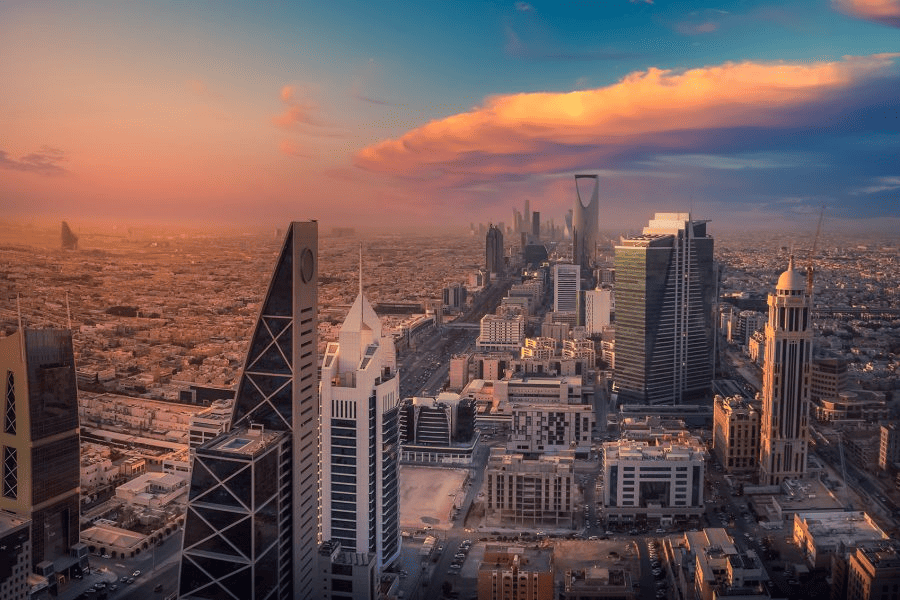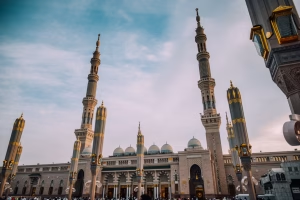Saudi Arabia is one of the most fascinating destinations in the Middle East where ancient traditions meet cutting-edge modernity. From the holy cities of Mecca and Medina to futuristic marvels like Riyadh and NEOM, the kingdom has opened its doors wider than ever before to global travelers. Yet, many visitors still find themselves asking the same question: Is Saudi Arabia safe to visit?
The answer is encouraging. With one of the lowest crime rates in the region, Saudi Arabia is considered a safe and welcoming country for tourists, provided you respect local customs and laws. Its rapidly growing tourism infrastructure, strict law enforcement, and strong cultural values make it a destination where travelers can explore confidently.
In this guide, we’ll uncover everything you need to know about staying safe in Saudi Arabia from understanding local etiquette and laws to navigating transportation and travel hotspots. Whether you’re visiting for pilgrimage, business, or adventure, this blog will help you experience the best of Saudi Arabia while traveling smartly and securely.
Is Saudi Arabia Safe Right Now?
Saudi Arabia is generally a very safe country to visit, thanks to its strong law enforcement, low crime rate, and modern infrastructure. Major cities like Riyadh, Jeddah, and Medina are well-policed and secure, making them welcoming for international travelers. Whether you’re visiting for pilgrimage, business, or leisure, understanding a few local customs and safety practices will ensure a smooth journey.
According to the Crime Index by Numbeo, Saudia Arabia scores well relative to other cities on safety indexes:
|
Crime Index Score |
Safety Scale Rating |
|
23.9 (low: less incidence of crime) |
76.09 (high level of safety) |
In comparison, London has a crime index score of 48.37! These numbers prove that Saudia Arabia is a safer city than most others, especially in the Middle East.
Suggested Read: Saudi Arabia Visa For Indians
Safety Tips for Travelers in Saudi Arabia
While Saudi Arabia is safe to visit, travelers should remember it’s still a deeply traditional country with its own social norms and regulations. To avoid any misunderstandings, dress modestly, respect prayer times, and avoid public displays of affection. Women travelers should be aware that, although social reforms have expanded rights and freedoms, gender segregation remains common in some settings.
Respect Local Laws and Norms
If you’re wondering “is it safe to travel to Saudi Arabia right now?”, the answer is yes provided you stay informed and prepared. Keep copies of your passport and important documents, avoid restricted areas, and always follow local laws. Carrying comprehensive travel and medical insurance is highly recommended. In case of emergencies, contact your embassy or consulate for support.
- Dress modestly, covering shoulders and knees. Women are not legally required to wear an abaya or headscarf, but it’s respectful to dress conservatively.
- Avoid public displays of affection, like kissing or holding hands. This is considered highly inappropriate.
- Never photograph government buildings, military sites, or locals without consent. Ask before taking pictures.
- Refrain from public criticism of Islam, the royal family, or the government. This can lead to arrest.
- Do not bring alcohol, drugs, pork products, or religious items (other than Islamic) into the country. These are illegal.
Driving Safety
If you plan to drive in Saudi Arabia, you’ll need an
- International driving permit along with your foreign license.
- Rent only from official agencies and make sure you have insurance.
A few key road rules and tips:
- Saudis drive on the right side of the road. Speed limits range from 45-120 km/h.
- Traffic can be chaotic, with frequent speeding and abrupt lane changes. Drive defensively.
- Outside major cities, roads are not well-lit. Avoid driving at night in rural areas.
- Off-road driving in the desert requires a 4×4 vehicle and proper equipment. Travel in a convoy if possible.
- Saudi Arabia has a zero-tolerance policy for alcohol in the blood while driving. This means that any detectable amount of alcohol in the bloodstream is prohibited.
- Travelers often use limousine services for long-distance travel.
Climate-related travel tips
- Saudi Arabia experiences extremely high temperatures. Wear lightweight, breathable clothing, stay hydrated, and avoid outdoor activities during peak sun hours.
- While daytime can be scorching, desert temperatures can drop significantly at night, especially in winter. Pack layers or a light jacket for cooler evenings.
- Sandstorms are common, particularly during the windy seasons. Carry protective eyewear, a face mask, and a scarf to shield yourself from dust.
- The dry climate can cause dehydration faster than you expect. Always carry water with you, especially when exploring remote areas or the desert.
- Apply sunscreen with SPF 30+ regularly.
Suggested Read: India Visa for Saudi Arabian Citizens

Women’s Safety in Saudi Arabia
Many travelers ask, “is it safe to travel to Saudi Arabia alone?” especially for women. The answer is increasingly positive. Women can now travel without a male guardian and enjoy much greater independence. Solo female tourists report feeling safe in most areas, especially in urban centers and tourist zones. However, it’s wise to dress conservatively and be mindful of local cultural boundaries.
- Dress modestly in public, avoiding tight or revealing clothing. Carry a lightweight abaya or scarf to wear as needed.
- Be prepared for gender segregation in restaurants, banks, parks, and on public transit. Look for designated “family” sections.
- Avoid interacting with unrelated men in public. Politely decline any inappropriate advances or invitations.
- If traveling solo, consider booking women-only hotel floors or joining female group tours for added security and peace of mind.
- Carry a phone with emergency contacts, and inform others of your daily travel plans.
- Ride-hailing apps like Careem and Uber offer the option to choose a female driver in many cities.
- Saudi Arabia has stringent anti-harassment laws to protect women. If you face any harassment or feel unsafe, you can report it to the police or call the 1919 helpline.
Suggested Read: Track Saudi Arabia Visa Status

Emergency Numbers in Saudi Arabia
In the unlikely event that you face an emergency in Saudi Arabia, know these key numbers:
- 999 – Police
- 997 – Ambulance and Fire
- 996 – Traffic Police
- 994 – Natural Disasters and Crises
- 937 – Passport and Visa Issues
You can also contact your home country’s embassy or consulate for assistance with emergencies, lost passports, or legal troubles. Keep your embassy’s 24/7 contact info stored in your phone and written down separately.
Additionally, make sure you have comprehensive travel and medical insurance to cover unexpected illness, injury, trip interruption, or loss of valuables. Confirm coverage limits and exclusions before your trip.
Suggested Read: How to Book a Visa Appointment for Saudi Arabia
Areas to Avoid in Saudi Arabia
While much of Saudi Arabia is safe for tourists, there are a few higher-risk regions to avoid:
- Border Regions with Yemen: Due to ongoing conflict in Yemen, areas near the southern border, such as Najran, Jazan, and Asir, may experience occasional cross-border attacks or instability.
- Remote Deserted Areas: While deserts are beautiful and attract adventure seekers, remote areas can pose risks like extreme weather, sandstorms, and getting lost without adequate supplies or guides.
- Shia-majority Eastern Province – Cities like Qatif and Al-Hasa sometimes experience sectarian tensions and anti-government protests that can turn violent. Steer clear of demonstrations or civil unrest.
- Areas During Hajj (If Not a Pilgrim): Mecca and Medina are restricted to Muslims during the Hajj season. Non-Muslims attempting to enter these areas may face fines or deportation.
Suggested Read: Reasons for Saudi Arabia Visa Rejection
Common Scams in Saudi Arabia
Even though is Saudi Arabia a safe country to visit, minor scams can occur in crowded areas or online travel platforms. Be cautious of unsolicited tour offers, fake taxi drivers, or overpriced souvenirs. Use verified transportation apps and book accommodations through reputable platforms to avoid issues.
- Overcharging Taxis – Unlicensed taxi drivers may claim the meter is broken and demand an inflated fare upon arrival. Use ride-hailing apps like Uber or Careem, which provide fixed rates.
- Counterfeit Goods – In markets like Riyadh’s Dira Souk, vendors may try to pass off fake designer clothes, shoes, or handbags as genuine articles. If a price seems too good to be true, the item is likely a knockoff.
- Gem and Carpet Scams – Pushy salesmen may pressure you to buy supposedly rare gems, antiques, or carpets at inflated prices, often claiming they can be resold abroad for a profit. Firmly decline any suspicious sales pitches.
- Pickpocketing – While uncommon, pickpocketing can occur in crowded souks or when getting on/off public transit. Keep wallets secure and carry bags in front of your body in busy areas.
- Currency Exchange Scams: Some unauthorized money exchangers may offer attractive rates but use hidden fees or counterfeit currency. Always exchange money at banks or official exchange offices.
Suggested Read: Famous Foods in Saudi Arabia
Nightlife Safety in Saudi Arabia
Because is Saudi Arabia safe for tourists, many locals and visitors enjoy going out at night to cafés, restaurants, and waterfront promenades. Alcohol is strictly prohibited, and there are no bars or nightclubs, but evening coffee shops and lounges are popular social spots. Stay alert in crowded areas, avoid unlicensed venues, and keep valuables secure.
Saudi Arabia is safe to visit, provided you respect its traditions, follow local laws, and travel responsibly. With growing tourism and improved hospitality standards, the kingdom offers an unforgettable mix of culture, spirituality, and modern experiences making it a truly secure and enriching destination.
- Stick to well-lit, busy areas and avoid walking alone on isolated streets. Take a licensed taxi instead of public transit.
- Avoid any establishment that seems seedy or allows suspicious loitering. Trust your instincts if a place feels unsafe.
- Respect cultural norms around gender segregation and refrain from public displays of affection, even if you see some locals breaking these taboos.
- Always carry a copy of your ID and enough cash to get back to your hotel. Keep emergency numbers on hand.
- Alcohol is illegal in Saudi Arabia, and possessing, consuming, or being under the influence of alcohol can lead to severe penalties, including jail time or fines. Avoid any places or activities where alcohol may be involved.
Suggested Read: Saudi Arabia Visa Photo Requirements



FAQs
How safe is it to visit Saudi Arabia?
Saudi Arabia is generally safe for tourists, with low crime rates and strict law enforcement. However, it’s important to stay informed about local laws and customs to ensure a smooth experience.
Is alcohol allowed in Saudi Arabia’s nightlife?
No, alcohol is strictly prohibited in Saudi Arabia. Possessing or consuming it can lead to severe legal consequences.
Are there late-night entertainment options in Saudi Arabia?
Yes, you can enjoy concerts, cultural festivals, movie theaters, and late-night dining in cities like Riyadh and Jeddah.
Is it safe for women to go out at night in Saudi Arabia?
Yes, major cities are generally safe for women at night. Use trusted transportation services, stick to well-lit areas, and follow cultural norms.
What should I wear when going out at night in Saudi Arabia?
Modest clothing is recommended. While women are not required to wear an abaya, covering arms and legs is advisable to respect local customs.




















